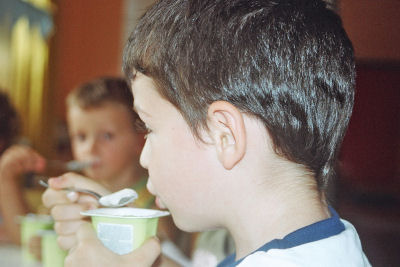Kosovo's urban poor hard hit by food crisis
19/06/2008
Updated field report from June 2008
The poverty crisis in Kosovo is becoming more serious by the day as food prices increase. The rising cost of grains, and with that bread, are affecting families stricken by devastating poverty. For children, this means increased vulnerability.
"As a result of malnutrition, the number of sick children is growing", says director of SOS Children Kosovo, Nezahat Salihu-Ramadani. According to the World Bank, 37 percent of Kosovars live below the poverty line. 15 percent of the population are extremely poor. Destruction of means of production and displacement and urbanisation of populations during the conflict of the 1990s had a large impact on many people's ability to secure and maintain their livelihoods. As a result of the food crisis, this vulnerability is increasing.
Food prices have risen throughout the Balkan region. Yet, Kosovo has been most affected as it strongly relies on the import of food products. In part this is due to lack of innovation in its agricultural sector during the 1990s.
Traditionally people in Kosovo live on bread, the staple food of most Kosovars, and other flour-based foods such as pastry. Despite the exemption of wheat and grain from taxes, the price of bread has doubled since November 2007, as have the prices of edible oil and flour. The price of rice, another staple, has increased by a third. Meat and dairy products are also affected. A carton of eggs now costs 3 instead of 1.90. The rising food prices have been noticeable in the last six months and have become more critical over the last quarter. A further increase of prices is expected.
For the poor this means an unbearable decrease in their purchasing power. "Most products have become unaffordable, especially for those who live on state benefits", says Nezahat Salihu-Ramadani. People now really have to prioritise their needs. There is a notable shift in what people are buying and eating.
The food crisis is a "family crisis"

In Kosovo, poverty is one of the most common reasons that families seek support in the framework of SOS family strengthening programmes. SOS Children's Villages Kosovo offers its services for families in two districts of the capital Pristina, Matiqan and Gracanica.
Matiqan is one of Pristina's poorest communities. The community has only one hospital and one school for a population of 7,000 Kosovar Albanians. One-third of the families in Matiqan rely on social welfare, the unemployment rate is around 80%, while cases of domestic violence, child labour and gender discrimination are increasing. Some families survive on as little as 35 per month in a society where one loaf of bread costs 0.50. Most of the families supported by the family strengthening programme are headed by single mothers, but there are also sibling-headed households and families where the parents are terminally ill or have psychological disorders.
Gracanica is a Serbian enclave in the south of the city. Since the 1999 conflicts, the nearly 10,000 inhabitants of Gracanica have led secluded lives behind barbwire fences protected by KFOR troops (NATO forces in Kosovo). Around 130 families in Gracanica share the same living conditions and risk of family breakdown as their Matiqan contemporaries. The Serbian families cope with movement restrictions and isolation, which deprives them of many public services.
Fetiye Gjaku-Morturi , a social worker for the family strengthening programme, is witnessing that people are struggling in day-to-day life and refers to the food crisis as a "family crisis". Family life is affected as families cannot cope with the soaring food prices. "A family of three may receive a sum of 55 euros a month. With the current food prices, this is proving to be far too little and people can only afford to buy essential food items."
The main focus of the SOS family strengthening programme in Pristina lies in the development of parental and vocational skills for adults and educational development for children. Specific aid, such as limited financial assistance and donations in kind, is offered in the beginning. Although there is a need to expand the family strengthening programmes, both to include more families and to offer more support to the families already in the programme, the funds and capacity currently available do not allow for it. However, four of the most vulnerable families in the family strengthening programme now receive monthly food packages.
The families in the SOS Children's Village in Pristina are coping with the situation by prioritising certain foods over others. Nezahat Salihu-Ramadani says that as the price of bread and oil, which are considered most essential, have doubled, the families have had to partly cut foods such as fruits, some types of vegetables, juice and meat out of their diets.
Relevant Countries: Kosovo.